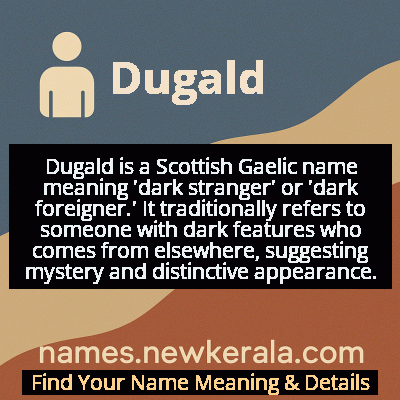Dugald Name Meaning & Details
Origin, Popularity, Numerology Analysis & Name Meaning of Dugald
Discover the origin, meaning, and cultural significance of the name DUGALD. Delve into its historical roots and explore the lasting impact it has had on communities and traditions.
Name
Dugald
Gender
Male
Origin
Gaelic
Lucky Number
4
Meaning of the Name - Dugald
Dugald is a Scottish Gaelic name meaning 'dark stranger' or 'dark foreigner.' It traditionally refers to someone with dark features who comes from elsewhere, suggesting mystery and distinctive appearance.
Dugald - Complete Numerology Analysis
Your Numerology Number
Based on Pythagorean Numerology System
Ruling Planet
Uranus (Rahu)
Positive Nature
Strong sense of order, loyal, practical, and disciplined.
Negative Traits
Stubborn, overly serious, rigid, and prone to feeling restricted.
Lucky Colours
Blue, gray.
Lucky Days
Saturday.
Lucky Stones
Blue sapphire.
Harmony Numbers
1, 7, 8.
Best Suited Professions
Managers, engineers, accountants, organizers.
What People Like About You
Dependability, discipline, practicality.
Famous People Named Dugald
Dugald Stewart
Philosopher
Leading figure of the Scottish Enlightenment and professor at University of Edinburgh
Dugald Clerk
Engineer
Inventor of the two-stroke engine and pioneer in internal combustion technology
Dugald Campbell Patterson
Architect
Notable Scottish architect who designed many buildings in Glasgow and surrounding areas
Dugald Macfadyen
Botanist
Scottish botanist known for his work on tropical flora and plant geography
Name Variations & International Equivalents
Click on blue names to explore their detailed meanings. Gray names with will be available soon.
Cultural & Historical Significance
In the 18th and 19th centuries, the name gained prominence through figures like philosopher Dugald Stewart, who helped shape the Scottish Enlightenment, cementing its place in Scottish intellectual history. The name's persistence through centuries demonstrates its enduring cultural relevance, serving as a link to Scotland's Gaelic past while adapting to changing linguistic and social contexts. It represents the survival and evolution of Gaelic culture within the broader Scottish national identity.
Extended Personality Analysis
Individuals named Dugald are often perceived as possessing a thoughtful, introspective nature combined with strong determination. The name's meaning of 'dark stranger' suggests someone who may initially appear reserved or mysterious, but who reveals depth and complexity upon closer acquaintance. They tend to be analytical thinkers with a methodical approach to problem-solving, often excelling in fields requiring careful consideration and precision. Historically, bearers of this name have demonstrated intellectual curiosity and a strong sense of tradition, balancing innovation with respect for established knowledge.
Their perceived 'stranger' quality might indicate an independent spirit or unconventional perspective that sets them apart while allowing them to bring fresh insights to challenging situations. This combination of depth, intelligence, and quiet strength makes Dugalds natural leaders who earn respect through competence rather than overt charisma. They are often seen as reliable, thoughtful individuals who approach life with careful consideration and maintain strong connections to their heritage and values while being open to new ideas and perspectives.
Modern Usage & Popularity
In contemporary times, Dugald remains a distinctly Scottish name that has never achieved widespread popularity outside Scotland and Scottish diaspora communities. It maintains a traditional, somewhat old-fashioned character that appeals to parents seeking names with strong Scottish heritage. While not common in modern birth registries, it continues to be used in Scotland, particularly among families with Gaelic heritage or those wishing to honor Scottish ancestry. The name has seen occasional revivals during periods of renewed interest in Celtic names and Scottish cultural identity. Its usage patterns reflect a preference for traditional, meaningful names over trendy or fashionable choices, positioning Dugald as a name chosen for its cultural significance rather than current popularity trends. The name's rarity in modern times adds to its distinctive character, making it a choice for parents seeking a unique yet historically grounded name.
Symbolic & Spiritual Meanings
Symbolically, Dugald represents the integration of foreign elements into established cultural frameworks, embodying the concept of the 'other' who becomes part of the community. The 'dark stranger' meaning carries connotations of mystery, depth, and the unknown, suggesting someone who brings new perspectives or hidden knowledge. In a broader sense, the name symbolizes the meeting of different cultures and the richness that comes from such exchanges. It represents the idea that what initially appears foreign or mysterious can become valued and integral to a community's identity. The name also carries associations with wisdom gained through experience and travel, suggesting a person who has navigated different worlds and brought back valuable insights that enrich their community while maintaining their unique perspective and character.

